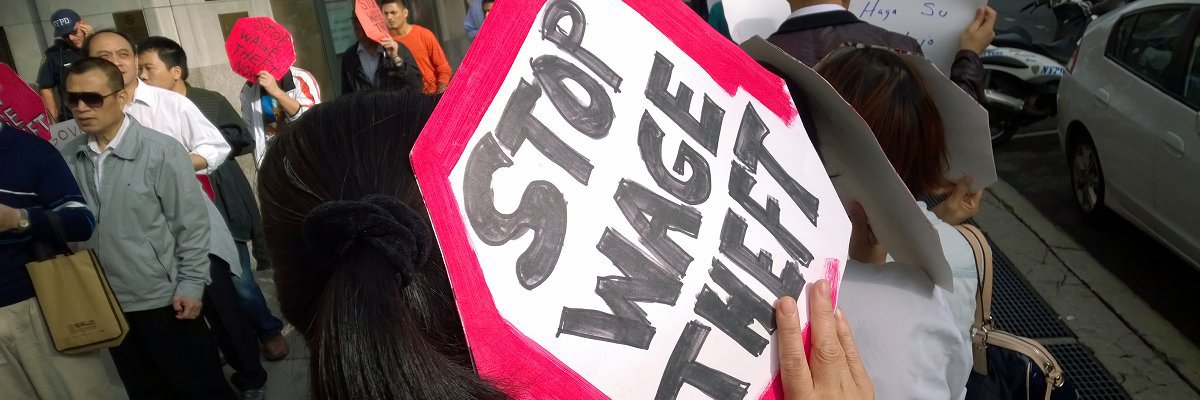Imagine standing in line at a coffee shop. It’s a hot, humid Boston day and you would like nothing more than a refreshing iced mocha. But there’s been a mistake, and the barista hands you not an iced mocha but a hot, hazelnut, half-caff, sugar-free latte with sprinkles.
It’s even got your name written on the cup.
How did they get hot, hazelnut, half-caff, sugar-free latte with sprinkles from your order of iced mocha? No matter. You inform the barista of the mistake, the proper iced mocha is made, and off you go to enjoy the sunshine.
What you might not know is that the manager has observed this and has told the barista that the retail cost of the mistaken coffee order must come from the tip jar.
Called “paying for mistakes,” this is one of many ways employers wrongfully steal from their workers in Boston. While infuriating, it’s hardly the most costly form of wage theft - much more damaging to this barista’s income, and more common in the food service industry, are unpaid training shifts, unpaid overtime, and denial of meal breaks.

Statement from a worker in a popular Cambridge coffee shop
Over the last several years, nearly one in five wage theft complaints from Boston workers to the Attorney General’s Office involved restaurants, recently released documents indicate. The documents cover complaints made after 2012, when the US Department of Labor found that dozens of Boston-area restaurants practiced wage owed their workers nearly $1.3 million, or roughly $2,600 to each worker.
The Massachusetts group Community Labor United estimates wage theft costs workers in Massachusetts almost $700 million annually. The Attorney General’s Office, tasked with protecting workers in this state, successfully recovers $5.2 million annually.
In terms of daily averages, employers steal nearly $2 million of labor each day, and the Attorney General wins back just $14,330 in compensation.

While restaurant workers are the most represented among the wage theft complaints to Attorney General Maura Healey’s office, they are hardly alone. Boston industries most impacted by wage theft include healthcare, construction, and the tech industry. In fact, a full 11% of complaints came from tech workers, though this likely represents more frequent reporting from tech workers compared to workers in other industries.
To Catch A Wage Thief
The Attorney General relies on workers to report wage theft, despite several recent studies showing that low-wage workers rarely do this.
Should a worker wish to file a statement, they must go on the record, submitting their name and personal information to the state along with a report of the problem and any evidence to support their case.

The Attorney General’s Office then forwards the complaint to the business and asks for a response.

Several restaurant servers interviewed for this article had previously declined to file complaints due to fears of retaliation. One server who discussed wage theft at a busy Somerville restaurant said she decided against filing a complaint because “even if the employer is in the wrong, [it] could potentially hurt my chances” of getting a job elsewhere.
Other servers interviewed did not know where to file a complaint, or considered the amount of theft too small to merit interest from the Attorney General’s Office.
Workers who are most likely to experience wage theft and other labor violations are the least likely to report them, concludes a recent study by Charlotte Alexander and Arthi Prasad of Georgia State University.

They argue that wage theft reporting systems - such as the one employed by the Massachusetts Attorney General’s Office - fail “particularly badly in the case of workers who are most vulnerable to workplace rights violations,” because they rely on the workers to file grievances.
Wage Theft and Power Imbalance
In June 2015 a person working as a housekeeper for a renowned Harvard Law School professor filed a statement with the Attorney General. Claiming the professor, who has argued several cases in front of the United States Supreme Court, and his wife withheld $315.50 in wages until a missing pair of shoes were found.

The statement continues: “[S]he told me … that she was going to sue me in small claims court for $400 dollars stating that it was my fault the shoes got lost.”

The documents do not provide any indication that this complaint was addressed or resolved, and there is no indication the Attorney General’s Office made any attempt to verify the claims.
This is one of many complaints reflecting the larger reality that possession of wages may be more than nine-tenths of the law.
Workers Not Reporting Wage Theft
More than 750 wage theft complaints have made from Boston-based workers over the last three years, and this represents the tip of a formidable iceberg.
According to one study, 68% of low-wage workers had experienced wage theft in the one week prior to being interviewed. On average the theft was $51 of labor. Spread over a year, this comes to $2634, or about 15% of what a low-wage worker expects to earn annually.
Often the amounts of theft are very small. The barista forced to pay for the hazelnut, half-caff, sugar-free latte described above would likely not report the theft of $4 from the tip jar due to a combination of not knowing how to file a grievance, not expecting that anyone would take action, and a very real fear of retaliation.

Statement from a Somerville cafe worker alleges wage theft and retaliation
The released documents show that wage theft has very real and often extremely severe consequences for low wage workers in our communities.
From the streets of Boston, a man working in the home healthcare industry files a statement with the Attorney General. He explains how his employer fired him, and then refused to pay the man’s wages. His statement concludes, “I haven’t had internet to fill out complaint until now and I’m homeless. That money would be more than helpful to my situation and he has inconvenienced to the greatest extent. Please help with my problem.”

There is no indication the Attorney General has looked into his complaint.
Read the full list of released complaints embedded below, or on the request page.
Experienced wage theft yourself? Contact the author at sparksbriant@gmail.com
Image by Peter Walsh and is licensed under CC BY-NC-ND 2.0




